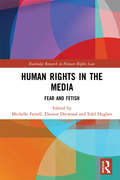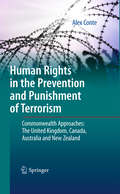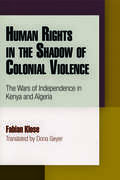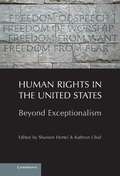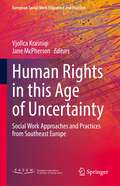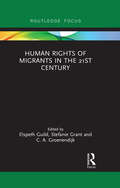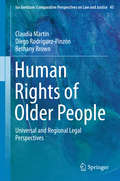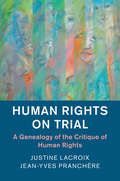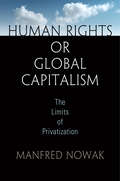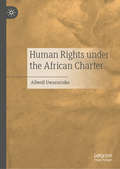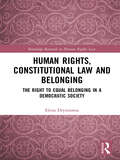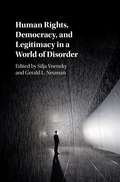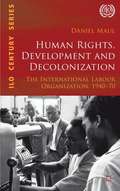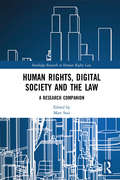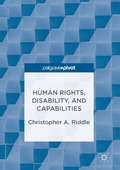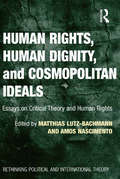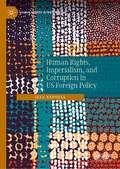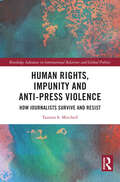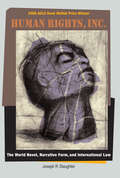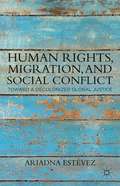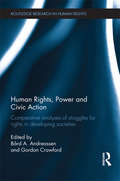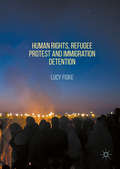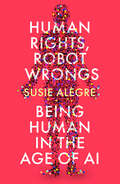- Table View
- List View
Human Rights in the Media: Fear and Fetish (Routledge Research in Human Rights Law)
by Michelle Farrell Eleanor Drywood Edel HughesThis collection sets about untangling some of the knotty issues in the underexplored relationship between human rights and the media. We investigate how complex debates in political, judicial, academic and public life on the role and value of human rights are represented in the media, particularly, in print journalism. To focus the discussion, we concentrate on media representation of the controversial proposals in the United Kingdom to repeal the Human Rights Act 1998 and to replace it with a British Bill of Rights. The collection is underpinned by the observation that views on human rights and on the proposals to repeal and replace are polarised. On the one hand, human rights are presented as threatening and, therefore, utterly denigrated; on the other hand, human rights are idolised, and, therefore, uncritically celebrated. This is the ‘fear and fetish’ in our title. The media plays a decisive role in constructing this polarity through its representation of political and ideological viewpoints. In order to get to grips with the fear, the fetish and this complex interrelationship, the collection tackles key contemporary themes, amongst them: the proposed British Bill of Rights, Brexit, prisoner-voting, the demonisation of immigrants, press freedom, tabloid misreporting, trial by media and Magna Carta. The collection explores media representation, investigates media polarity and critiques the media’s role.
Human Rights in the Middle East
by Mahmood MonshipouriExploring the most formidable human rights challenges facing the Middle East - the rights of women, minorities, migrant workers, and those of various sexual orientations, and the rights of all people to engage in civil disobedience - this volume addresses the extent to which dynamics surrounding human rights conditions in the region conform to or diverge from such dynamics in other parts of the world. Offering wide-ranging and rich analyses, the contributors to this volume argue that for human rights to be effectively enforced, they must be locally justified and achieved. The 2011 Arab revolts demonstrate that the people of the region can shape the condition of human rights in their societies.
Human Rights in the Prevention and Punishment of Terrorism
by Alex ConteThis title takes a comparative approach to the evaluation of human rights in the prevention and punishment of terrorism within the United Kingdom, Canada, Australia and New Zealand. The text first looks at the question of defining terrorism, and examines the international and domestic frameworks for countering terrorism. The second part of the book provides an overview and analysis of international and regional human rights law and its capacity to allow for the limitation of rights and freedoms when pursing important objectives such as the countering of terrorism, as well as providing a comparative review of human rights laws in each country. The final and most extensive part of the text begins with an overview of the interaction between counter-terrorism and human rights, followed by thematic and case study evaluations of discreet topics.
Human Rights in the Shadow of Colonial Violence: The Wars of Independence in Kenya and Algeria (Pennsylvania Studies in Human Rights)
by Fabian KloseHuman Rights in the Shadow of Colonial Violence explores the relationship between the human rights movement emerging after 1945 and the increasing violence of decolonization. Based on material previously inaccessible in the archives of the International Committee of the Red Cross and the United Nations Human Rights Commission, this comparative study uses the Mau Mau War (1952-1956) and the Algerian War (1954-1962) to examine the policies of two major imperial powers, Britain and France. Historian Fabian Klose considers the significance of declared states of emergency, counterinsurgency strategy, and the significance of humanitarian international law in both conflicts.Klose's findings from these previously confidential archives reveal the escalating violence and oppressive tactics used by the British and French military during these anticolonial conflicts in North and East Africa, where Western powers that promoted human rights in other areas of the world were opposed to the growing global acceptance of freedom, equality, self-determination, and other postwar ideals. Practices such as collective punishment, torture, and extrajudicial killings did lasting damage to international human rights efforts until the end of decolonization.Clearly argued and meticulously researched, Human Rights in the Shadow of Colonial Violence demonstrates the mutually impacting histories of international human rights and decolonization, expanding our understanding of political violence in human rights discourse.
Human Rights in the Twentieth Century
by Stefan-Ludwig HoffmannHas there always been an inalienable "right to have rights" as part of the human condition, as Hannah Arendt famously argued? The contributions to this volume examine how human rights came to define the bounds of universal morality in the course of the political crises and conflicts of the twentieth century. Although human rights are often viewed as a self-evident outcome of this history, the essays collected here make clear that human rights are a relatively recent invention that emerged in contingent and contradictory ways. Focusing on specific instances of their assertion or violation during the past century, this volume analyzes the place of human rights in various arenas of global politics, providing an alternative framework for understanding the political and legal dilemmas that these conflicts presented. In doing so, this volume captures the state of the art in a field that historians have only recently begun to explore.
Human Rights in the United States
by Shareen Hertel Kathryn LibalThis book brings to light emerging evidence of a shift toward a fuller engagement with international human rights norms and their application to domestic policy dilemmas in the United States. The volume offers a rich history, spanning close to three centuries, of the marginalization of human rights discourse in the United States. Contributors analyze cases of U.S. human rights advocacy aimed at addressing persistent inequalities within the United States itself, including advocacy on the rights of persons with disabilities; indigenous peoples; lone mother-headed families; incarcerated persons; lesbian, gay, bisexual and transgendered people; and those displaced by natural disasters. It also explores key arenas in which legal scholars, policy practitioners and grassroots activists are challenging multiple divides between 'public' and 'private' spheres (for example, in connection with children's rights and domestic violence) and between 'public' and 'private' sectors (specifically, in relation to healthcare and business and human rights).
Human Rights in this Age of Uncertainty: Social Work Approaches and Practices from Southeast Europe (European Social Work Education and Practice)
by Vjollca Krasniqi Jane McPhersonThis book, grounded in a human rights framework, takes a close look at social work approaches and practices in Southeast Europe. Human rights are central in today's understanding of social work as an academic discipline and as a professional practice. Looking at social work through a human rights lens unmasks inequality and discrimination, promotes ethical engagements, and contributes to the social, political, and economic betterment of society. Moreover, human rights and social work are interdependent and have far-reaching implications at macro, mezzo, and micro levels both in the realm of social policy and in professional practice.This collection of eight chapters provides an overview of human rights practices in social work in Albania, Bosnia and Herzegovina, Bulgaria, Croatia, Kosovo, Romania, and Slovenia. It presents state-of-the-art research on human rights and social work through individual country-focused chapters. In addition, it includes an integrative introductory chapter that identifies and discusses the commonalities and differences across the region as well as future directions.The book takes an integrated approach with conversations among the contributors on three main questions:What is the state of human rights in social work?How are human rights practiced in social work? What are the prospects for an integrated approach to human rights in social work in contemporary Southeast Europe?Human Rights in this Age of Uncertainty is essential reading for social work academics and practitioners in Southeast Europe due to its geographic focus and standpoints from the specific countries of the region. The book also should appeal to a wider European audience (especially as the book features chapters from both inside and outside of the European Union), as well as to an international audience of social work scholars. In addition, policy-makers may find the book a useful resource because human rights discourse features prominently in the international approaches to welfare systems across Southeast Europe as part of the Europeanisation processes currently at play.
Human Rights of Migrants in the 21st Century (Routledge Studies in Liberty and Security)
by Elspeth Guild Stefanie Grant C. A. GroenendijkThis book offers an accessible examination of the human rights of migrants in the context of the UN’s negotiations in 2018. This volume has two main contributions. Firstly, it is designed to inform the negotiations on the UN’s Global Compact for Safe, Orderly and Regular Migration announced by the New York Declaration of the UN General Assembly on 19 September 2016. Second, it intends to assist officials, lawyers and academics to ensure that the human rights of migrants are fully respected by state authorities and international organisations and safeguarded by national and supranational courts across the globe. The overall objective of this book is to clarify problem areas which migrants encounter as non-citizens of the state where they are and how international human rights obligations of those states provide solutions. It defines the existing international human rights of migrants and provides the source of States’ obligations. In order to provide a clear and useful guide to the existing human rights of migrants, the volume examines these rights from the perspective of the migrant: what situations do people encounter as their status changes from citizen (in their own country) to migrant (in a foreign state), and how do human rights provide legal entitlements regarding their treatment by a foreign state? This book will be of much interest to students of migration, human rights, international law and international relations.
Human Rights of Older People
by Bethany Brown Claudia Martin Diego Rodríguez-PinzónThis book focuses on descriptions of the developments in legal frameworks and policies regarding the human rights of older persons. First, it covers the policies adopted and practices developed at the universal system, particularly within the sphere of the United Nations. Second, it includes a side-by-side comparison of the work of regional human rights mechanisms, which have picked up some momentum in the past decade. Through its inclusion of law, policy, and current processes, the widest net possible has been cast to collect a descriptive resource for advocates. Overall, we hope that this book contributes to a better understanding of the current limitations and possibilities that international institutions offer to uphold the human rights of older persons. We expect that this information will allow states and other policy makers to move forward with the international recognition of the human rights of older persons. We know this is only a first effort in compiling and reporting the standards that are being produced by different international institutions. But we have no doubt that many others will follow with their expert analysis of these emerging standards, and that the ongoing discussion will finally crystalize in international human rights binding instruments explicitly recognizing the universal rights of older persons.
Human Rights on Trial: A Genealogy Of The Critique Of Human Rights (Human Rights In History Ser.)
by Justine Lacroix Jean-Yves PranchèreThe first systematic analysis of the arguments made against human rights from the French Revolution to the present day. Through the writings of Edmund Burke, Jeremy Bentham, Auguste Comte, Louis de Bonald, Joseph de Maistre, Karl Marx, Carl Schmitt and Hannah Arendt, the authors explore the divergences and convergences between these 'classical' arguments against human rights and the contemporary critiques made both in Anglo-American and French political philosophy. Human Rights on Trial is unique in its marriage of history of ideas with normative theory, and its integration of British/North American and continental debates on human rights. It offers a powerful rebuttal of the dominant belief in a sharp division between human rights today and the rights of man proclaimed at the end of the eighteenth century. It also offers a strong framework for a democratic defence of human rights.
Human Rights or Global Capitalism: The Limits of Privatization
by Manfred NowakThe fall of communism in the late 1980s and the end of the Cold War seemed to signal a new international social order built on pluralist democracy, the rule of law, and universal human rights. <P><P>But the window of opportunity for creating this more just, more equal, and more secure world slammed shut just as quickly as it opened. Rather than celebrate the triumph of democracy over autocracy, or political freedom over totalitarian rule, the West exulted in the victory of capitalism over communism. <P><P>Neoliberal policies of deregulation and privatization that minimized the role of the state were imposed on the transitional societies of Central and Eastern Europe, as well as economically weak and politically fragile nations in Africa, Asia, and Latin America. Twenty-five years later, the world reaps the fruits of that market-driven state foundation: inequality; poverty; global economic, food, financial, social, and ecological crises; transnational organized crime and terrorism; proliferating weapons; fragile states. <P><P>Human Rights or Global Capitalism is not simply concerned with the success or failure of neoliberal policies per se or judging whether they are good or bad. Rather, it examines the application of those policies from a human rights perspective and asks whether states, by outsourcing to the private sector many services with a direct impact on human rights--education, health, social security, water, personal liberty, personal security, equality--abdicate their responsibilities to uphold human rights and thereby violate international human rights law. <P><P>Manfred Nowak explores these examples and outlines the ways in which neoliberal policies contravene the obligations of states to protect the human rights of their people.
Human Rights under the African Charter
by Allwell UwazuruikeThis book critically examines the civil, political, socioeconomic, and group rights protected under the African Charter and its Protocol on women’s rights. It then examines the institutional protection of these rights through the African Commission and African Court. The book builds on the concept of regionalism within Africa and the recent drive for finding “African solutions to African problems” by tracing the development of human rights within Africa and assessing the effectiveness of Africa’s core regional human rights institutions. In turn, it critically analyses the obstacles to the full implementation of human rights in Africa such as the lack of political will, jurisdictional issues, lack of resources and funding, poverty, illiteracy, corruption, and customary practices that violate human rights. In closing, the book discusses possible solutions to these problems.
Human Rights, Constitutional Law and Belonging: The Right to Equal Belonging in a Democratic Society (Routledge Research in Human Rights Law)
by Elena DrymiotouWhile every constitution includes a provision over the right to equal protection of the laws, perhaps with different terminology, this book interprets this right in a new way. Theories of the right to equal protection of the laws as the right to anti-subordination are the most influential theories on the theory suggested by Drymiotou. Elena Drymiotou suggests understanding the right to equal protection of the laws in terms of belonging. She goes on to identify certain criteria and she offers a general theory of the Right to Democratic Belonging. This book uses political theory, constitutional provisions and case law to suggest this new theory of the right to equal protection of the laws; the theory of the Right to Equal Belonging in a Democratic Society or in other words, the Right to Democratic Belonging. Human Rights and Equal Belonging in a Democratic Society is the starting point of a more comprehensive theory of the right to democratic belonging. It will be of interest both to students at an advanced level, academics and reflective practitioners. It addresses the topics with regard to human rights and equality and will be of interest to researchers, academics, policymakers and students in the fields of human rights law, constitutional law and legal theory.
Human Rights, Democracy, and Legitimacy in a World of Disorder
by Gerald L. Neuman Silja VoenekyHuman Rights, Democracy, and Legitimacy in a World of Disorder brings together respected scholars from diverse disciplines to examine a trio of key concepts that help to stabilize states and the international order. While used pervasively by philosophers, legal scholars, and politicians, the precise content of these concepts is disputed, and they face new challenges in the conditions of disorder brought by the twenty-first century. This volume will explore the interrelationships and possible tensions between human rights, democracy, and legitimacy, from the philosophical, legal, and political perspectives; as well as the role of these concepts in addressing particular problems such as economic inequality, catastrophic risks posed by new technologies, access to health care, regional governance, and responses to mass migration. Made up of essays arising from an interdisciplinary symposium convened at Harvard Law School in 2016, this volume will examine how these trusted concepts may bring order to the global community.
Human Rights, Development and Decolonization
by Daniel MaulAn innovative diplomatic and intellectual history of decolonization, post-colonial nation building and international human rights and development discourses, this study of the role of the ILO during 1940-70 opens up new perspectives on the significance of international organisations as actors in the history of the 20th century.
Human Rights, Digital Society and the Law: A Research Companion (Routledge Research in Human Rights Law)
by Mart SusiThe Internet has created a formidable challenge for human rights law and practice worldwide. International scholarly and policy-oriented communities have so far established a consensus regarding only one main aspect – human rights in the internet are the same as offline. There are emerging and ongoing debates regarding not only the standards and methods to be used for achieving the "sameness" of rights online, but also whether "classical" human rights as we know them are contested by the online environment. The internet itself, in view of its cross-border nature and its ability to affect various areas of law, requires adopting an internationally oriented approach and a perspective strongly focused on social sciences. In particular, the rise of the internet, enhanced also by the influence of new technologies such as algorithms and intelligent artificial systems, has influenced individuals’ civil, political and social rights not only in the digital world, but also in the atomic realm. As the coming of the internet calls into question well-established legal categories, a broader perspective than the domestic one is necessary to investigate this phenomenon. This book explores the main fundamental issues and practical dimensions related to the safeguarding of human rights in the internet, which are at the focus of current academic debates. It provides a comprehensive analysis with a forward-looking perspective of bringing order into the somewhat chaotic online dimension of human rights. It addresses the matter of private digital censorship, the apparent inefficiency of existing judicial systems to react to human rights violations online, the uncertainty of liability for online human rights violations, whether the concern with personal data protection overshadows multiple other human rights issues online and will be of value to those interested in human rights law and legal regulation of the internet.
Human Rights, Disability, and Capabilities
by Christopher A. RiddleThis book presents the argument that health has special moral importance because of the disadvantage one suffers when subjected to impairment or disabling barriers. Christopher A. Riddle asserts that ill health and the presence of disabling barriers are human rights issues and that we require a foundational conception of justice in order to promote the rights of people with disabilities. The claim that disability is a human rights issue is defended on the grounds that people with disabilities experience violations to their dignity, equality, and autonomy. Because human rights exist as a subset of other justice-based rights, Riddle contends that we must support a foundation of justice compatible with endorsing these three principles (equality, dignity, and autonomy). This volume argues that the "capabilities approach" is the best currency of justice for removing the disabling barriers that consistently violate approximately one billion people's human rights.
Human Rights, Human Dignity, and Cosmopolitan Ideals: Essays on Critical Theory and Human Rights (Rethinking Political and International Theory)
by Amos Nascimento Matthias Lutz-BachmannThis book makes a significant contribution to the on-going international dialogue on the meaning of concepts such as human rights, humanity, and cosmopolitanism. The authors propose a new agenda for research into a Critical Theory of Human Rights. Each chapter pursues three goals: to reconstruct modern philosophical theories that have contributed to our views on human rights; to highlight the importance of humanity and human dignity as a complementary dimension to liberal rights; and, finally, to integrate these issues more directly in contemporary discussions about cosmopolitanism. The authors not only present multicultural perspectives on how to rethink political and international theory in terms of the normativity of human rights, but also promote an international dialogue on the prospects for a critical theory of human rights discourses in the 21st century.
Human Rights, Imperialism, and Corruption in US Foreign Policy (Human Rights Interventions)
by Ilia XypoliaThis book provides a novel account of the role of human rights discourse in the US foreign policy. The book analyses the US State Department’s Annual Country Reports on Human Rights Practices as a means to monopolise and, more importantly, legitimise a specific framing of the human rights agenda to further US foreign policy. The US agenda’s deviation from established international human rights standards has very serious implications considering the preponderant global influence exercised by the US. Furthermore, more recently, the reports have added a separate section on "corruption" as a human rights issue. “Corruption”, a controversial concept from the outset, is understood in a narrow way as a public sector issue that largely prevails in and subverts the so-called developing and transition countries. This book shows how this recent inclusion ultimately serves the US global neoliberal imperialist agenda and becomes the hegemonic discourse in international organisations.
Human Rights, Impunity and Anti-Press Violence: How Journalists Survive and Resist (Routledge Advances in International Relations and Global Politics)
by Tamsin S. MitchellHuman Rights, Impunity and Anti-Press Violence is a qualitative, comparative and interdisciplinary exploration of journalists’ responses to impunity for anti-press violence in two Latin American partial democracies, Mexico and Honduras. It is the first book-length analysis of the security and protection of journalists who can also be seen as human rights defenders. The book draws on 89 interviews with such journalist-defenders and organisations that support them, carried out in 2018 and 2022/23. It shows how journalists use several interlinked strategies to seek justice and protection: domestic and international strategies (“protection approaches,” or making rights demands of the state, often via intermediaries), and activist and professional strategies (“self-protection approaches”).Critical of international relations scholarly debates on the value of international human rights law/norms to local civil society, Tamsin Mitchell demonstrates that while protection approaches based on such standards are important and valued, they are not enough: self-protection is central – and increasingly so. She advocates the need to take a more bottom-up and inclusive approach to civil society and the importance of alternative, non-legal norms in (self-)protection and truth- and justice-seeking.Suitable for both academics and practitioners, Human Rights, Impunity and Anti-Press Violence prescribes new areas of research and debate in international relations, global studies, human rights and media/journalism studies.
Human Rights, Inc.: The World Novel, Narrative Form, and International Law
by Joseph R. SlaughterIn this timely study of the historical, ideological, and formal interdependencies of the novel and human rights, Joseph Slaughter demonstrates that the twentieth-century rise of “world literature” and international human rights law are related phenomena. Slaughter argues that international law shares with the modern novel a particular conception of the human individual. The Bildungsroman, the novel of coming of age, fills out this image, offering a conceptual vocabulary, a humanist social vision, and a narrative grammar for what the Universal Declaration of Human Rights and early literary theorists both call “the free and full development of the human personality.”Revising our received understanding of the relationship between law and literature, Slaughter suggests that this narrative form has acted as a cultural surrogate for the weak executive authority of international law, naturalizing the assumptions and conditions that make human rights appear commonsensical. As a kind of novelistic correlative to human rights law, the Bildungsroman has thus been doing some of the sociocultural work of enforcement that the law cannot do for itself. This analysis of the cultural work of law and of the social work of literature challenges traditional Eurocentric histories of both international law and the dissemination of the novel. Taking his point of departure in Goethe’s Wilhelm Meister, Slaughter focuses on recent postcolonial versions of the coming-of-age story to show how the promise of human rights becomes legible in narrative and how the novel and the law are complicit in contemporary projects of globalization: in colonialism, neoimperalism, humanitarianism, and the spread of multinational consumer capitalism.Slaughter raises important practical and ethical questions that we must confront in advocating for human rights and reading world literature—imperatives that, today more than ever, are intertwined.
Human Rights, Migration, and Social Conflict: Towards a Decolonized Global Justice
by Ariadna EstévezThis book uses human rights as part of a constructivist methodology designed to establish a causal relationship between human rights violations and different types of social and political conflict in Europe and North America.
Human Rights, Power and Civic Action: Comparative analyses of struggles for rights in developing societies (Routledge Research in Human Rights)
by Gordon Crawford Bård A. AndreassenHuman Rights, Power and Civic Action examines the interrelationship between struggles for human rights and the dynamics of power, focusing on situations of poverty and oppression in developing countries. It is argued that the concept of power is a relatively neglected one in the study of rights-based approaches to development, especially the ways in which structures and relations of power can limit human rights advocacy. Therefore this book focuses on how local and national struggles for rights have been constrained by power relations and structural inequalities, as well as the extent to which civic action has been able to challenge, alter or transform such power structures, and simultaneously to enhance protection of people’s basic human rights. Contributors examine and compare struggles to advance human rights by non-governmental actors in Cambodia, China, Ghana, Kenya, South Africa and Zimbabwe. The country case-studies analyse structures of power responsible for the negation and denial of human rights, as well as how rights-promoting organisations challenge such structures. Utilising a comparative approach, the book provides empirically grounded studies leading to new theoretical understanding of the interrelationships between human rights struggles, power and poverty reduction. Human Rights, Power and Civic Action will be of interest to students and scholars of human rights politics, power, development, and governance.
Human Rights, Refugee Protest and Immigration Detention
by Lucy FiskeThis bookbuilds a compelling picture of injustices inside immigration detention centers,within the context of the rise of the use of immigration detention in the GlobalNorth. The author presents the rarely heard voices of refugees, bringing theirperspectives to light and personalising and humanising a global politicalissue. Based onin-depth interviews with formerly detained refugees who were involved in a widerange of protests, such as sit-ins and non-compliance, hunger strikes, lipsewing, escapes and riots, Human Rights, Refugee Protest and ImmigrationDetention presents a comprehensive insight into immigrationdetention and protest. Drawingon the work of Michel Foucault and Hannah Arendt, the book challengescontemporary human rights discourses which institutionalise power and will be amust-read for scholars, advocates and policymakers engaged in debates aboutimmigration detention and forced migration.
Human Rights, Robot Wrongs: A Manifesto for Humanity in the Age of AI
by Susie AlegreA highly topical manifesto about what it means to be human in the age of AI by a leading barrister. No longer an uncertain technology of the distant future, artificial intelligence is starting to shape every aspect of our daily lives, from how we think to who we love. In this urgent polemic, leading barrister Susie Alegre explores the ways in which artificial intelligence threatens our fundamental human rights - including the rights to life, liberty and fair trial; the right to private and family life; and the right to free expression - and how we protect those rights. Touching on the many profound ethical dilemmas posed by emerging technologies, and full of fascinating case studies, Human Rights, Robot Wrongs is a rallying cry for humanity in the age of AI.
